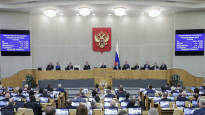Russia ratified the agreement in 2000. Mikael Moring, Chief Inspector of the Swedish Radiation Protection Agency, considers the significance of Russia’s decision to be practically insignificant.
The Russian State Duma voted today in favor of the country withdrawing the ratification of the Nuclear Test Ban Treaty, reports the Russian State News Agency Tass. Russia ratified the agreement in 2000.
President Vladimir Putin announced at a meeting of the central forum known as the Valdai Club on October 5 that Russia may be withdrawing ratification of the treaty. The next day MP Vyacheslav Volodin announced that he would bring the matter to the Duma for consideration.
Before the Duma hearing that started on Tuesday, Volodin argued that the cancellation of the ratification is necessary to guarantee Russia’s security.
– We have been waiting 23 years for the United States to ratify this agreement. However, it has not done that because it acts with double standards and is irresponsible towards global security issues. For the security of our country, we cancel the ratification of the agreement, Volodin wrote on his Telegram channel.
However, Russia will not withdraw from the agreement completely
Chief inspector of Radiation Safety Center STUK Mikael Moring says that he takes a “practically calm” approach to withdrawing Russia’s ratification, as Russia is not withdrawing from the agreement completely.
Moring has worked with the Comprehensive Nuclear Test-Ban Treaty Organization (CTBTO) for over 20 years. CTBTO manages a global monitoring network, with hundreds of measuring stations and several laboratories monitoring compliance with the nuclear test ban.
Moring emphasizes that, according to his own words, Russia is not withdrawing from the agreement, only from its ratification.
– That’s a big difference. Russia operates many international measuring stations that are part of the CTBTO monitoring network. As long as all this activity remains, the practical significance of withdrawing the ratification is minor, says Moring.
With the cancellation of the ratification, Russia’s position within the scope of the agreement is therefore the same as, for example, China and the United States, because they have not ratified the agreement, even though they have signed it.
Withdrawal of ratification is a political message
Although the withdrawal of Russia’s ratification has no effect in practice, it contains a political message.
Moring considers Russia’s withdrawal from international agreements to be a “bad political signal”.
– Some may interpret it as increasing the risk of Russia’s nuclear test. Russia has insisted that it will not conduct a nuclear test unless the United States does one first.
– In my opinion, Russia could have conducted a nuclear test without these actions, because the agreement is not valid. However, it must be noted that North Korea is the only country that has conducted a nuclear test this millennium.
Also ‘s Russia correspondent Heikki Heiskanen sees that Russia is sending a political message by canceling the ratification, the primary target of which is the United States.
– We want to convey that Russia can also take steps backwards in international agreements if it wants to. It is also communication that the United States has not ratified the agreement either, says Heiskanen.
There has been a discussion in Russia about whether the nuclear deterrent is still strong enough and whether something should be done to increase the deterrent, Heiskanen says.
– The strength of nuclear deterrence is discussed in public and nuclear weapons are talked about quite a lot. Dismantling the contract system is, of course, tinkering: when we can’t agree on anything, we’ll dismantle this too.
However, Heiskanen sees that even though withdrawing from the treaty’s ratification does not necessarily mean the start of nuclear tests in Russia, there are threats associated with the slowly disintegrating treaty system.
– When there are no more contracts to break up and such means of communication have been used up, are there finally concrete actions, such as a nuclear test, at the end of this road? That’s the threat here.
